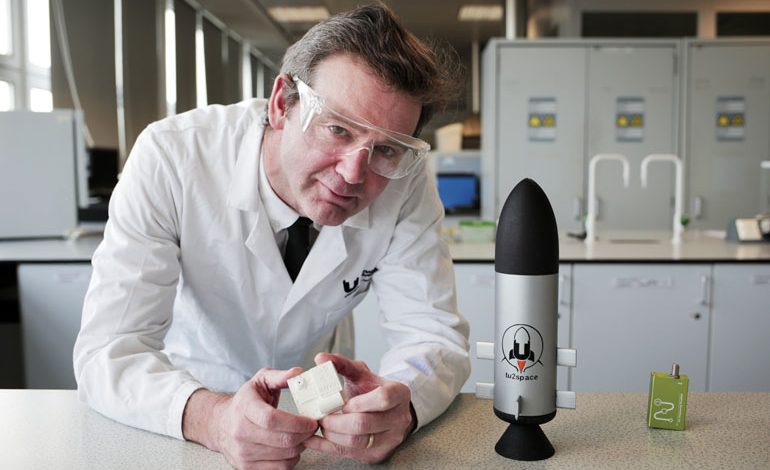The UK has a unique opportunity to be a world leader in a new commercial space age, predicts one of the industry’s leading figures ahead of a major conference.
“Old space” was dominated by giant government institutes such as NASA, while “new space” is more commercially driven, said Claire Barcham, commercial space director, UK Space Agency.
Innovative technologies have created a new generation of smaller satellites that do not require giant rockets to get into orbit, paving the way for the UK to develop a launch programme and become a trailblazer in space in the 21st Century.
Darlington-based Scoutek, for example (above), is working with Teesside University to develop a rapid, low-cost launch rocket – a StratoBooster, which ascends on a meteorological balloon – to send ThumbSats into space from the region by this summer.
If successful, the “tu2space” project will be the first civilian space mission to launch from UK soil.
“We are creating a major new industry with opportunities for businesses across the UK to be part of an innovative value chain that will bring space closer to home,” said Barcham.
She is one of the industry leaders and experts addressing the conference, Discover the Possibilities: Into the Blue, held by the North East Satellite Applications Centre of Excellence on March 28, at the National Glass Centre in Sunderland.
The Government’s Spaceflight Programme, jointly delivered by Department for Transport, UK Space Agency and Civil Aviation Authority, aims to kick-start small satellite launch and sub-orbital flight from the UK.
Last year it announced funding for a spaceport in Scotland, which will offer opportunities across the UK in technology for satellites, launch services, and the applications that will use the data gathered in space.
Barcham said: “We believe there is now a tremendous opportunity to develop new launch vehicles that will be smaller to offer a dedicated premium service to get into orbit.
“Other countries are doing the same, but thanks to our unique geographic position with its high latitude and remote coastal regions offering safe launches, this is a field in which the UK can lead the world.
“For instance, the North East has growing expertise in situational awareness which is the kind of innovative technology that can help keep space clear of debris and monitor the health of the environment on land and in the oceans.”
The conference will address the role of space and satellite technology in tackling issues such as using the sea for food and energy, trade and travel, improved communications for ports and shipping, and pollution.
Other speakers include: Sean McCarthy, head of market intelligence at the Satellite Applications Catapult, Harwell; Cathrine Armour, director of customer division, UK Hydrographic Office; and Rebecca Ball, creative director for Sunderland Culture. Representatives from the five North East ports will also discuss a pilot scheme to develop digital initiatives in the ports.
The North East Satellite Applications Centre of Excellence is managed by Business Durham, the economic development organisation for County Durham.
Catherine Johns, innovation director at Business Durham, said: “The development of a UK launch capability will allow us to play a leading international role in tackling some of the biggest problems on land and in the oceans.
“The North East, along with other regions, can make an important contribution in developing the hardware and technology for rockets and satellites and harnessing the valuable data gathered from space.”
The Discover the Possibilities: Into the Blue conference will take place on March 28, at the National Glass Centre, Liberty Way, Sunderland SR6 0GL.








